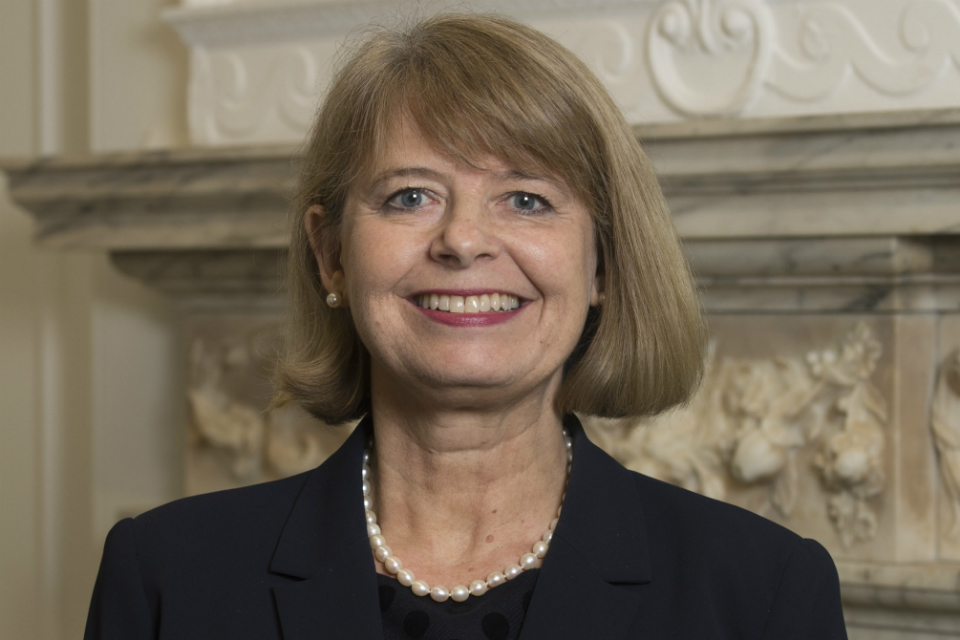Economic Secretary to the Treasury's keynote speech at Women in Banking and Finance Awards
Economic Secretary, Harriett Baldwin discusses the Women In Finance Charter, championing gender diversity in financial services.

Well I’m delighted to be taking part in this event today. And I want to start by congratulating all of the talented people who have been singled out for an award this year.
It’s right that exceptional and impressive achievements like yours are not only recognised inside your own organisations but are celebrated more widely as an example and inspiration to others.
Once again this is a chance to reflect on the achievements of women in the world of finance. And that specific focus on women is really important. Not because we are any better than men in this sector, nor any worse. But because this is an industry still dominated by men.
Yet harnessing the talents of women is essential if we want to make sure this industry continues to be successful in the UK. Quite simply, if we want to maintain our reputation as a world-leader in financial services, we need to be a world-leader in diversity too. This is to the benefit of the UK economy as a whole. Because there are huge gains to be made if we can really make a change here. In fact, the OECD estimate that if you make the role of men and women in the labour market equal, you could increase your GDP by 10% by 2030.
But there is a lot of work to do to make this a reality.
When I started working at an investment bank in the late eighties, women were seriously under-represented. And, I regret to say, it remains the case 30 years later. Look for, example, at the difference between what women are paid, compared to men, in the financial services industry. The gap is worse than in any other industry in the UK. In fact it is almost double the national average – at almost 40%. That means for every £1 a man earns, a woman gets about 60p.
It’s not just about pay.
It’s about women making it to the top jobs, sitting in the board rooms, and being at the helms of our biggest companies. And it is absolutely shocking, that in 2016, only 6% of CEOs in financial services are women. It’s not much better if you look one step down the ladder either.
This has got to change.
And it is more important than ever that we keep finding, recognising and celebrating women like these as the role models and standard bearers of this sector.
It is equally important that we don’t wait around and hope that the representation of women will just get better on its own. We need to tackle this head on. And I can tell you that this is one of my very top priorities as the Minister responsible for financial services.
That’s why I asked Jayne-Anne Gadhia, the CEO of Virgin Money, to look at why so few women were represented in the top jobs, and what we could do about it. I’d like to thank her once again for the huge amount of work she put into this – looking at thousands of responses to her survey, and doing in-depth consultations with around 60 different financial firms. And in March this year, she published an excellent review, recommending key ways in which any organisation in the industry could support women into the more senior roles.
Well we think the steps she outlined could make a real difference.
That’s why the government decided to launch the HM Treasury Women in Finance Charter and ask companies to sign up to these principles. This was launched at the Bank of England, and backed at the very highest level by the Governor Mark Carney.
And I’m really pleased to see that so many firms have already joined up – including big, household names like Barclays, HSBC, Lloyds Banking Group and – of course – the company led by Jayne-Anne herself, Virgin Money.
So you’ll forgive me, I’m sure, if I use this occasion to ask everyone here to get involved.
If you work at a company which hasn’t signed up, or you aren’t sure if your company even knows about the Women in Finance Charter, why not go back and start that conversation?
At the Treasury, we’re happy to provide any further information or support to help you – so please just get in touch with us. Because we will soon be publishing a full list of all the companies which have made that pledge and we want to see as many businesses represented as possible.
There are lots of reasons for a firm to make this commitment. That starts, of course, with helping women in your workforce make the most of their potential. But it’s also been proven to be good for business - companies which improve their gender balance are also likely to improve their balance sheet too. Whereas those who lag behind risk not only losing out to their rivals in terms of performance, but also in terms of recruiting the best talent, or retaining and attracting your customers.
So I’d like to thank Women in Banking and Finance, not only for holding these awards, but for the work they do throughout the year to help women in this industry.
And as we celebrate today the achievements of some of the most talented women in the business, let’s also think about how we can see more women like these succeeding, rising up the ranks, and leading this industry forward.
If we work together to make that happen…
Not only will firms do better.
Not only will the financial services sector prosper.
But the whole country will reap the benefits.